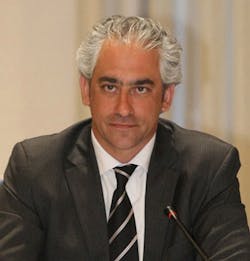Greece: Water Privatisation Battle
Surprising to many, Greece is endowed with abundant water resources of 58 billion cubic meters per year. Yet, like its finances, mismanagement has left the country's 230 different municipal utilities in need of help. Government plans to privatise two of Athens' largest water companies didn't go according to plan but at what price for international involvement in the country?
By Jeremy Josephs
Edit the famous song title from the film Grease and you have Greece Lightning. This seems an entirely appropriate analogy for the thunderbolt which has befallen the Greek economy in recent years. Unsurprisingly, this has impacted heavily on each and every aspect of the country's water sector. The country battles against the odds to keep up with the requirements of the European Framework Directive while the topic of water privatisation has been part of an impassioned and ongoing national debate.
So much so that in virtually every institution, from the EU to the OECD and the IMF there is now incessant and anguished discussion about the possible ramifications of what is referred to as Grexit - a Greek withdrawal from the Eurozone monetary union.
While ancient Greece is seen as the seminal civilisation that provided the very foundation of modern Western culture, there is considerably less unanimity as to why it entered into decline in the first place. A recent study published in Scientific journal PLOS ONE argues that it was a 300-year drought that caused the demise of several eastern Mediterranean civilizations and cultures, including ancient Greece, some 3,200 years ago.
Modern day Greece continues to be plagued by severe and regular water shortages, especially on the Greek islands, some of which are supplied by tanker ships or have turned to desalination for water supply. Ironically, the country is in fact endowed with abundant water resources of 58 billion cubic meters per year, of which the country uses just 12%.
Speaking exclusively to WWi magazine, Spyros Kouvelis, Greece's former deputy minister for foreign affairs and current member of the Mediterranean Action Plan of the United Nations Environment Programme, says: "That's because of Greece's particular geography. So when it comes to droughts it depends on which part of the country you are talking about. To simplify matters you can divide Greece with a line through the center.
"While the north is rich in water resources as you move towards eastern Greece and the Aegean, well, precipitation falls dramatically. As for our islands - well, obviously you have a lot of tourism which means everyone requiring water when there happens to be no rainfall at all. So the basic situation is not complicated - we don't have the water where and when we require it."
Following Wall Street's implosion in 2008 Greece became the epicenter of Europe's debt crisis, oten classed as a weak link in the Eurozone, requiring multiple bailouts.
Mismanagement, unsurprisingly, has been reflected in the country's water sector - not so much in Athens and Thessaloniki, where the two semi-private utilities EYDAP and EYATH are in charge of water supply and sanitation, but in the country's no less than 230 different municipal utilities. The Kallikratis plan for local government reform was designed to merge these smaller municipalities and utilities into larger units. But since the program was presented by the previous socialist Papandreou cabinet rather than the new left-leaning and ruling Syriza party, the plan is now officially "under review".
Privatisation problems
The battles relating to the merging of Greece's utilities pale into insignificance when compared to the issue of water privatisation. The government's plan was to privatise both EYDAP and EYATH - the previous government announced that it would reduce its share in the two companies to 51% as part of a broader Hellenic Privatisation Program.
The Greek parliament went further still - arguing that the companies should be sold off in their entirety. Despite early interest from France's Suez Environnement and Israel's Mekorot, there was what could be considered a major political earthquake with the Coalition of the Radical Left (Syriza) being elected as the largest party in the Hellenic Parliament and with its young and charismatic chairman, Alexis Tsipras, being sworn in as Prime Minister of Greece.
Tsipras's message was quite clear: austerity and privatisation were at the very top of his ‘no' list. The Irish anti-water charges campaign became ‘inspirational' to the people of Greece, according to Maria Karagianni, a member of Syriza's youth wing, who was closely involved in the three yearlong running anti-privatisation campaign which culminated in a referendum in May 2014 in which the people voted overwhelming "Okh'I" -- no in Greek.
Greece's highest constitutional court, the Council of State, took the unprecedented step of blocking the proposed privatisation of the country's biggest water utility (Athens Water) on the grounds that the sale could put public health at risk. Both Suez Environnement and Mekerot were expectantly unavailable for comment on the issue.
Targeting agriculture
Kouvelis adds: "The key issue, in my view, is that we need a full restructuring of how agriculture is carried out in Greece."
"To free up water with a view to doing better and more sustainable things. For example we need improved irrigation technologies. Water cannons irrigating maize in the middle of the day - 40% evaporates and doesn't even reach the crops - whilst at the same the EU continues to subsidize crops like cotton which are not at all sustainable. It's crazy.
"The key here is to make sure that you have appropriate water management in the long-term because we have 16,000 kms of coast line with tourism and cities developing apace. This means that you have to have not a five-year but a 20-year plan - really looking ahead into the future with a view to developing the accompanying infrastructure appropriately."
Kouvelis adds: "Broadly speaking we have to take on board the notion that water is part of the renewable energy source of Greece - especially in terms of the smaller hydro power stations that can and need to be developed as much as possible."
Russian investment
Water privatisation might be off of the Greek agenda, for the moment at least. But there are other developments in the Mediterranean. For as the Greek government appears to be tiring of European demands to get its financial act together, so its leaders have been looking towards Moscow rather than Brussels. But everything comes with a price. Russia may well be prepared to throw some money towards Greece but at what price?
Why, nothing less than "particular Greek assets". While one Russian source failed to specify what these might be, it is rumored that Moscow might well have its eyes set on the Greek gas company DEPA, the train operator TrainOSE - not to mention the sea ports of Athens and Thessaloniki alike.
In such a swift and fast moving situation it's of course impossible to predict what the outcome is likely to be. For what is happening in the water sector is clearly intimately bound up with what is happening higher up the economic and political chains. What is clear is that nothing is likely to happen at a lightning pace. And certainly not Greece Lightning.
Jeremy Josephs is freelance contributor for WWi magazine. Email: [email protected]
More Water & WasteWater International Archives Issue Articles



